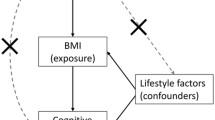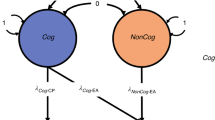Abstract
Aims
Observational studies have reported a negative association between educational attainment and type 2 diabetes (T2D), but the causality remains largely unknown. The aim of this study is to investigate the potential causal effect of educational attainment on T2D and whether such an effect is independent of cognitive performance.
Methods
We conducted two-sample Mendelian randomization (MR) analysis using genetic variants strongly associated with educational attainment and cognitive performance to estimate the causal associations with T2D, among 61,714 T2D cases and 593,952 controls. We also performed multivariable MR to explore the independent effects of educational attainment and cognitive performance on T2D risk.
Results
In univariable MR, we found evidence that genetically predicted higher educational attainment [odds ratio (OR) 0.53 per 1-standard deviation (SD) increase; 95% confidence interval (CI) 0.47–0.60] and cognitive performance (OR 0.79 per 1-SD increase; 95%CI 0.69–0.91) were related to decreased risk of T2D. Our further multivariable MR results suggested that more years of education led to a reduced likelihood of T2D independently of cognitive performance (OR 0.52; 95%CI 0.42–0.64). However, the protective effect of cognitive performance on T2D was attenuated once educational attainment was controlled for (OR 1.08; 95%CI 0.88–1.32).
Conclusions
We provided evidence to suggest that educational attainment protects against T2D independently of cognitive performance, but does not support a negative causal association between cognitive performance and T2D independently of educational attainment. Education might represent a potential target for intervention to battle type 2 diabetes risk.


Similar content being viewed by others
Data availability
The data that support the findings of this study are available from the corresponding author upon reasonable request.
Code availability
The code that supports the findings of this study is available from the corresponding author upon reasonable request.
References
Lascar N, Brown J, Pattison H et al (2018) Type 2 diabetes in adolescents and young adults. Lancet Diabetes Endocrinol 6(1):69–80. https://doi.org/10.1016/S2213-8587(17)30186-9
Seiglie JA, Marcus ME, Ebert C et al (2020) Diabetes Prevalence and Its Relationship With Education, Wealth, and BMI in Twenty-Nine Low- and Middle-Income Countries. Diabetes Care. https://doi.org/10.2337/dc19-1782
Yang GR, Yuan SY, Fu HJ et al (2015) Influence of educational attainments on long term glucose control and morbid events in patients with type 2 diabetes receiving integrated care from 15 China urban communities: The Beijing community diabetes study 11. Prim Care Diabetes 9(6):473–481. https://doi.org/10.1016/j.pcd.2015.03.005
Du C, He C, Dong L et al (2020) Associations of apnea hypopnea index and educational attainments with microvascular complications in patients with T2DM. Endocrine 67(2):363–373. https://doi.org/10.1007/s12020-020-02192-w
Cukierman-Yaffe T, Kasher-Meron M, Fruchter E et al (2015) Cognitive performance at late adolescence and the risk for impaired fasting glucose among young adults. J Clin Endocrinol Metab 100(12):4409–4416. https://doi.org/10.1210/jc.2015-2012
Twig G, Gluzman I, Tirosh A et al (2014) Cognitive function and the risk for diabetes among young men. Diabetes Care 37(11):2982–2988. https://doi.org/10.2337/dc14-0715
Anderson EL, Howe LD, Wade KH et al (2020) Education, intelligence and Alzheimer’s disease: evidence from a multivariable two-sample Mendelian randomization study. Int J Epidemiol. https://doi.org/10.1093/ije/dyz280
Lee JJ, Wedow R, Okbay A et al (2018) Gene discovery and polygenic prediction from a genome-wide association study of educational attainment in 1.1 million individuals. Nat Genet 50(8):1112–1121. https://doi.org/10.1038/s41588-018-0147-3
Trampush JW, Yang ML, Yu J et al (2017) GWAS meta-analysis reveals novel loci and genetic correlates for general cognitive function: a report from the COGENT consortium. Mol Psychiatry 22(3):336–345. https://doi.org/10.1038/mp.2016.244
Xue A, Wu Y, Zhu Z et al (2018) Genome-wide association analyses identify 143 risk variants and putative regulatory mechanisms for type 2 diabetes. Nat Commun 9(1):2941. https://doi.org/10.1038/s41467-018-04951-w
Morris AP, Voight BF, Teslovich TM et al (2012) Large-scale association analysis provides insights into the genetic architecture and pathophysiology of type 2 diabetes. Nat Genet 44(9):981–990. https://doi.org/10.1038/ng.2383
Banda Y, Kvale MN, Hoffmann TJ et al (2015) Characterizing race/ethnicity and genetic ancestry for 100,000 subjects in the genetic epidemiology research on adult health and aging (gera) cohort. Genetics 200(4):1285–1295. https://doi.org/10.1534/genetics.115.178616
Bycroft C, Freeman C, Petkova D et al (2018) The UK Biobank resource with deep phenotyping and genomic data. Nature 562(7726):203–209. https://doi.org/10.1038/s41586-018-0579-z
Scott RA, Lagou V, Welch RP et al (2012) Large-scale association analyses identify new loci influencing glycemic traits and provide insight into the underlying biological pathways. Nat Genet 44(9):991–1005. https://doi.org/10.1038/ng.2385
Soranzo N, Sanna S, Wheeler E et al (2010) Common variants at 10 genomic loci influence hemoglobin A(1)(C) levels via glycemic and nonglycemic pathways. Diabetes 59(12):3229–3239. https://doi.org/10.2337/db10-0502
Bowden J, Del Greco MF, Minelli C et al (2017) A framework for the investigation of pleiotropy in two-sample summary data Mendelian randomization. Stat Med 36(11):1783–1802. https://doi.org/10.1002/sim.7221
Verbanck M, Chen CY, Neale B, Do R (2018) publisher correction: detection of widespread horizontal pleiotropy in causal relationships inferred from Mendelian randomization between complex traits and diseases. Nat Genet 50(8):1196. https://doi.org/10.1038/s41588-018-0164-2
Bowden J, Davey Smith G, Haycock PC, Burgess S (2016) Consistent estimation in mendelian randomization with some invalid instruments using a weighted median estimator. Genet Epidemiol 40(4):304–314. https://doi.org/10.1002/gepi.21965
Bowden J, Davey Smith G, Burgess S (2015) Mendelian randomization with invalid instruments: effect estimation and bias detection through Egger regression. Int J Epidemiol 44(2):512–525. https://doi.org/10.1093/ije/dyv080
Zhao Q, Jingshu Wang, Jack Bowden, Dylan S. Small (2018) Statistical inference in two-sample summary-data Mendelian randomization using robust adjusted profile score. arXiv 1801.09652
Bowden J, Del Greco MF, Minelli C et al (2016) Assessing the suitability of summary data for two-sample Mendelian randomization analyses using MR-Egger regression: the role of the I2 statistic. Int J Epidemiol 45(6):1961–1974. https://doi.org/10.1093/ije/dyw220
Hemani G, Tilling K, Davey Smith G (2017) Orienting the causal relationship between imprecisely measured traits using GWAS summary data. PLoS Genet 13(11):e1007081. https://doi.org/10.1371/journal.pgen.1007081
Brion MJ, Shakhbazov K, Visscher PM (2013) Calculating statistical power in Mendelian randomization studies. Int J Epidemiol 42(5):1497–1501. https://doi.org/10.1093/ije/dyt179
Kamat MA, Blackshaw JA, Young R et al (2019) PhenoScanner V2: an expanded tool for searching human genotype-phenotype associations. Bioinformatics 35(22):4851–4853. https://doi.org/10.1093/bioinformatics/btz469
Sacerdote C, Ricceri F, Rolandsson O et al (2012) Lower educational level is a predictor of incident type 2 diabetes in European countries: the EPIC-InterAct study. Int J Epidemiol 41(4):1162–1173. https://doi.org/10.1093/ije/dys091
Choi AI, Weekley CC, Chen SC et al (2011) Association of educational attainment with chronic disease and mortality: the Kidney Early Evaluation Program (KEEP). Am J Kidney Dis 58(2):228–234. https://doi.org/10.1053/j.ajkd.2011.02.388
Abouzeid M, Wikstrom K, Peltonen M et al (2015) Secular trends and educational differences in the incidence of type 2 diabetes in Finland, 1972–2007. Eur J Epidemiol 30(8):649–659. https://doi.org/10.1007/s10654-015-0008-7
Aekplakorn W, Chariyalertsak S, Kessomboon P et al (2018) Prevalence of Diabetes and Relationship with Socioeconomic Status in the Thai Population: National Health Examination Survey, 2004–2014. J Diabetes Res 2018:1654530. https://doi.org/10.1155/2018/1654530
Hwang J, Shon C (2014) Relationship between socioeconomic status and type 2 diabetes: results from Korea National Health and Nutrition Examination Survey (KNHANES) 2010–2012. BMJ Open 4(8):e005710. https://doi.org/10.1136/bmjopen-2014-005710
Janke K, Johnston DW, Propper C, Shields MA (2019) The causal effect of education on chronic health conditions in the UK. J Health Econ 70:102252. https://doi.org/10.1016/j.jhealeco.2019.102252
Ma Y, Nolan A, Smith JP (2018) The value of education to health: Evidence from Ireland. Econ Hum Biol 31:14–25. https://doi.org/10.1016/j.ehb.2018.07.006
Gilman SE, Martin LT, Abrams DB et al (2008) Educational attainment and cigarette smoking: a causal association? Int J Epidemiol 37(3):615–624. https://doi.org/10.1093/ije/dym250
Crum RM, Helzer JE, Anthony JC (1993) Level of education and alcohol abuse and dependence in adulthood: a further inquiry. Am J Public Health 83(6):830–837. https://doi.org/10.2105/ajph.83.6.830
Lakka TA, Kauhanen J, Salonen JT (1996) Conditioning leisure time physical activity and cardiorespiratory fitness in sociodemographic groups of middle-ages men in eastern Finland. Int J Epidemiol 25(1):86–93. https://doi.org/10.1093/ije/25.1.86
Zimmer Z, House JS (2003) Education, income, and functional limitation transitions among American adults: contrasting onset and progression. Int J Epidemiol 32(6):1089–1097. https://doi.org/10.1093/ije/dyg254
Twig G, Tirosh A, Derazne E et al (2018) Cognitive function in adolescence and the risk for premature diabetes and cardiovascular mortality in adulthood. Cardiovasc Diabetol 17(1):154. https://doi.org/10.1186/s12933-018-0798-5
Wang A, Stronks K, Arah OA (2014) Global educational disparities in the associations between body mass index and diabetes mellitus in 49 low-income and middle-income countries. J Epidemiol Commun Health 68(8):705–711. https://doi.org/10.1136/jech-2013-203200
Sudlow C, Gallacher J, Allen N et al (2015) UK biobank: an open access resource for identifying the causes of a wide range of complex diseases of middle and old age. PLoS Med 12(3):e1001779. https://doi.org/10.1371/journal.pmed.1001779
Acknowledgements
We gratefully thank the Social Science Genetic Association consortium, UK Biobank, COGENT consortium, DIAGRAM consortium, GERA consortium and MAGIC consortium for providing summary statistics data.
Funding
This study received the support of Social Welfare Science and Technology Research Project of Zhongshan City (Grant Number 2018b1065).
Author information
Authors and Affiliations
Corresponding authors
Ethics declarations
Conflict of interest
The authors declare that they have no conflict of interest.
Consent to participate
All participants provided informed consent.
Ethical approval
All data sources were approved by relevant institutional review boards. The studies were performed in accordance with the ethical standards laid down in the 1964 Declaration of Helsinki.
Additional information
Publisher's Note
Springer Nature remains neutral with regard to jurisdictional claims in published maps and institutional affiliations.
This article belongs to the topical collection Health Education and Psycho-Social Aspects, managed by Massimo Porta and Marina Trento
Supplementary information
Below is the link to the electronic supplementary material.
Rights and permissions
About this article
Cite this article
Liang, J., Cai, H., Liang, G. et al. Educational attainment protects against type 2 diabetes independently of cognitive performance: a Mendelian randomization study. Acta Diabetol 58, 567–574 (2021). https://doi.org/10.1007/s00592-020-01647-w
Received:
Accepted:
Published:
Issue Date:
DOI: https://doi.org/10.1007/s00592-020-01647-w




